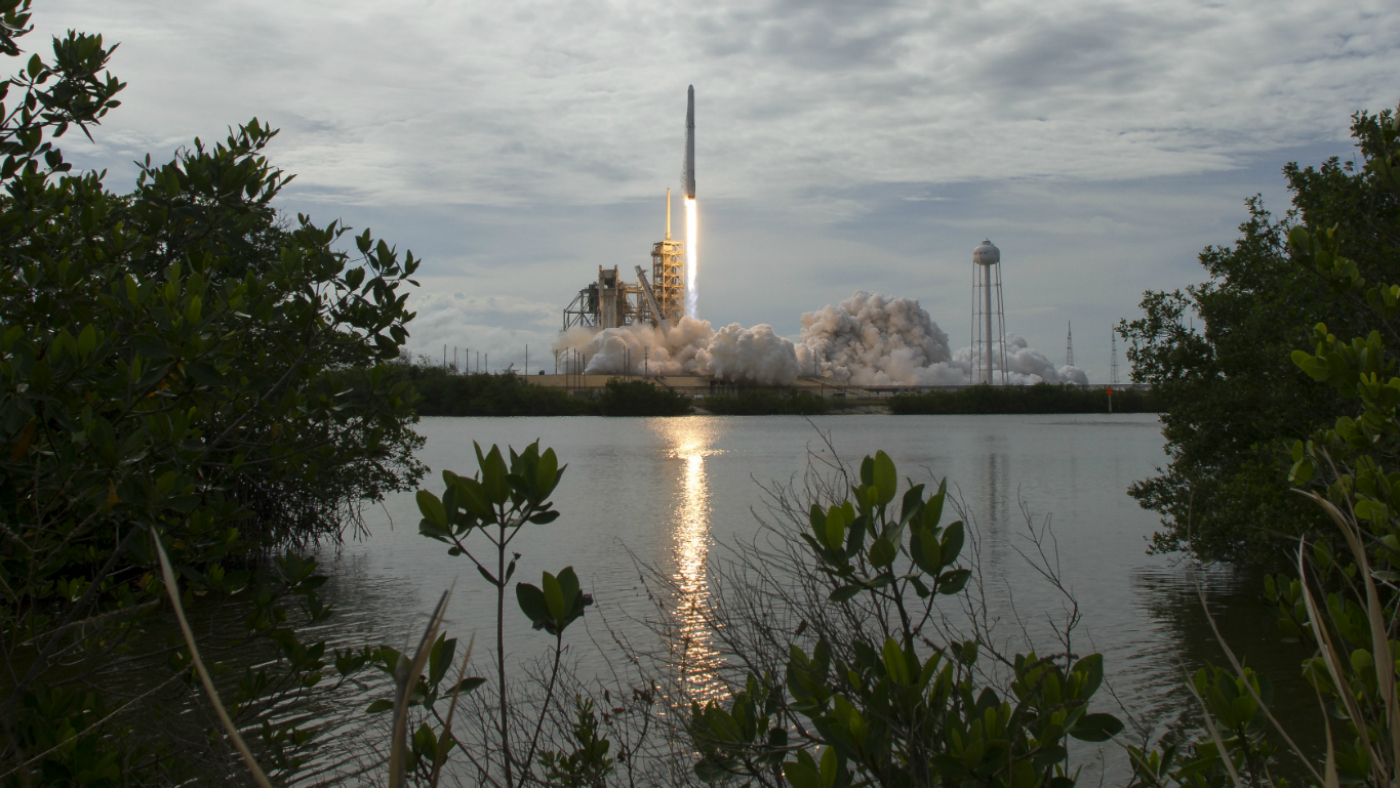SpaceX secret satellite mission branded ‘a total loss’
Zuma craft reportedly burned up in fireball after failing to detach from rocket

A free daily email with the biggest news stories of the day – and the best features from TheWeek.com
You are now subscribed
Your newsletter sign-up was successful
A secret US government satellite launched aboard a SpaceX rocket is “presumed to be a total loss” after it failed to reach orbit.
Industry and US government officials believe the satellite, code-named Zuma, fell back into the Earth’s atmosphere “because it didn’t separate as planned from the upper part of the rocket”, reports The Wall Street Journal.
However, the newspaper adds, the lack of details around the mission and the craft itself means “some possible alternate sequence of events other than a failed separation may have been the culprit”.
The Week
Escape your echo chamber. Get the facts behind the news, plus analysis from multiple perspectives.

Sign up for The Week's Free Newsletters
From our morning news briefing to a weekly Good News Newsletter, get the best of The Week delivered directly to your inbox.
From our morning news briefing to a weekly Good News Newsletter, get the best of The Week delivered directly to your inbox.
Although the launch and landing of SpaceX’s Falcon 9 rocket on Sunday night was labelled a success, says The Verge, neither the aerospace firm nor the satellite’s manufacturer, Northrop Grumman, confirmed that the secret payload had reached orbit.
Speaking to the website, SpaceX said: “We do not comment on missions of this nature, but as of right now, reviews of the data indicate Falcon 9 performed nominally.”
This indicates that the fault may lie with the Zuma satellite itself, adds The Verge, as the aerospace firm’s rocket “pulled off all the tasks it’s supposed to perform” during the mission.
The Zuma launch is the company’s third classified mission for the US government and was seen as “critically important” for gaining greater funding from the US Department of Defence, says Ars Technica.
A free daily email with the biggest news stories of the day – and the best features from TheWeek.com
SpaceX launches secret Zuma craft for US government
8 January
Elon Musk’s SpaceX has sent a secret US government spacecraft codenamed Zuma towards an undisclosed orbit.
The company, founded by the Tesla chief, launched the mysterious Zuma satellite aboard one of its Falcon 9 rockets last night from the Cape Canaveral spaceport in Florida, reports Alphr.
After the satellite was deployed in orbit, the site says, the firm was able to return the main booster stage of the rocket back to Earth. This will allow SpaceX to refurbish the rocket and use it again for another mission.
It’s the 21st time the company has executed the “pioneering manoeuvre” of landing the booster rocket, says Alphr.
It’s also the third time the aerospace firm has carried out a classified mission, which is arguably its most secretive flight for the US government, Ars Technica reports.
Neither SpaceX nor the US military have disclosed the purpose of the Zuma craft, but the news site says the satellite was created by aerospace firm Northrop Grumman.
Time says that SpaceX plans to launch a total of 30 rockets over the year, which is 12 more than last year.
-
 How Democrats are turning DOJ lemons into partisan lemonade
How Democrats are turning DOJ lemons into partisan lemonadeTODAY’S BIG QUESTION As the Trump administration continues to try — and fail — at indicting its political enemies, Democratic lawmakers have begun seizing the moment for themselves
-
 ICE’s new targets post-Minnesota retreat
ICE’s new targets post-Minnesota retreatIn the Spotlight Several cities are reportedly on ICE’s list for immigration crackdowns
-
 ‘Those rights don’t exist to protect criminals’
‘Those rights don’t exist to protect criminals’Instant Opinion Opinion, comment and editorials of the day
-
 Elon Musk’s pivot from Mars to the moon
Elon Musk’s pivot from Mars to the moonIn the Spotlight SpaceX shifts focus with IPO approaching
-
 Moltbook: the AI social media platform with no humans allowed
Moltbook: the AI social media platform with no humans allowedThe Explainer From ‘gripes’ about human programmers to creating new religions, the new AI-only network could bring us closer to the point of ‘singularity’
-
 Will regulators put a stop to Grok’s deepfake porn images of real people?
Will regulators put a stop to Grok’s deepfake porn images of real people?Today’s Big Question Users command AI chatbot to undress pictures of women and children
-
 Data centers could soon be orbiting in space
Data centers could soon be orbiting in spaceUnder the radar The AI revolution is going cosmic
-
 Inside a Black community’s fight against Elon Musk’s supercomputer
Inside a Black community’s fight against Elon Musk’s supercomputerUnder the radar Pollution from Colossal looms over a small Southern town, potentially exacerbating health concerns
-
 X update unveils foreign MAGA boosters
X update unveils foreign MAGA boostersSpeed Read The accounts were located in Russia and Nigeria, among other countries
-
 What's Linda Yaccarino's legacy? And what's next for X?
What's Linda Yaccarino's legacy? And what's next for X?Today's Big Question An 'uncertain future' in the age of TikTok
-
 X CEO Yaccarino quits after two years
X CEO Yaccarino quits after two yearsSpeed Read Elon Musk hired Linda Yaccarino to run X in 2023